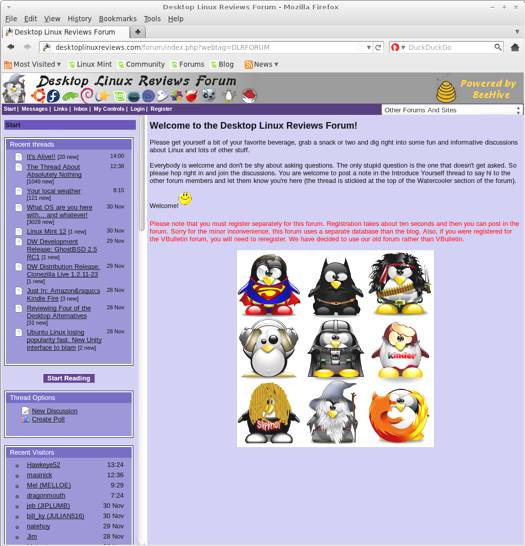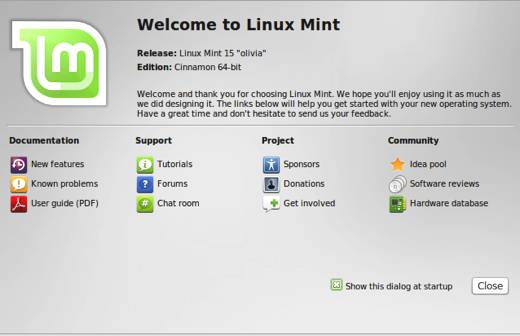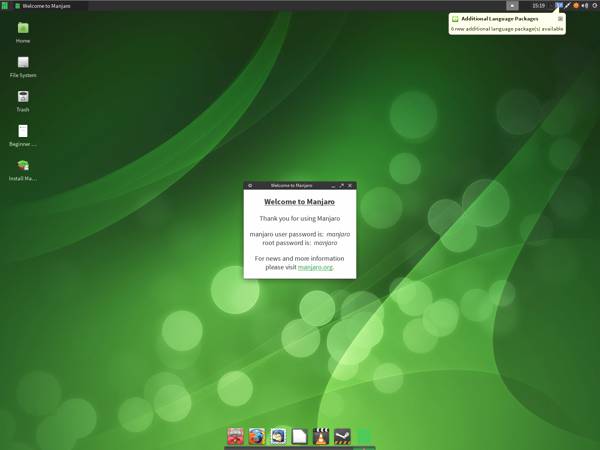Ubuntu 13.04 has been released, so it’s time to do another review of Canonical’s popular distro. This time around Ubuntu’s code name is “Raring Ringtail.” It appears to be a reference to the ring-tailed cat. I had no idea what a ring-tail cat is, so of course I googled.
Here’s some background on the a ring-tailed cat:
The ringtail (Bassariscus astutus) is a mammal of the raccoon family (thus not actually a cat), native to arid regions of North America. It is also known as the ringtail cat, ring-tailed cat, miner’s cat or “marv cat”, and is also sometimes mistakenly called a “civet cat” (after similar, though unrelated, cat-like omnivores of Asia and Africa). The ringtail is sometimes called a cacomistle, though this term seems to be more often used to refer to Bassariscus sumichrasti.
Aaah, now that we all know about ring-tailed cats, let’s get on with the review.
What’s New in Ubuntu 13.04
Here’s a sample of the new features in this release:
Linux kernel 3.8.8
Unity 7
Upstart 1.8
LibreOffice 4.0
CUPS 1.6.2
Python 3.3
Simplified Details Panel in Software Updater
Upstart User Sessions
Friends (replaces Gwibber)
Linux kernel 3.8.8
Ubuntu 13.04 includes the 3.8.0-19.29 Ubuntu Linux kernel which was based on the v3.8.8 upstream Linux kernel.
Unity 7
Unity 7 brings a lot of performance improvements, reduced memory consumption and a great number of small UI fixes to bring a better overall shell experience. Those are like being typo-tolerant in the dash when searching for an application, using the mouse scroll wheel on a launcher icon to switch between applications or better available third party devices handling. You will notice as well some new icons themes to continue on lead of bringing design as the central Ubuntu experience.
You will notice that only one workspace is available by default on any new installation. If you want to bring back workspaces, you can find an option in the Appearance panel of System Settings under the Behavior tab. You can as well enable “Show desktop” button on the Launcher.
Upstart 1.8
This release provides a new bridge, the upstart-file-bridge(8) that allows jobs to react to filesystem changes. For example, to have a job start when a particular file is created:
start on file FILE=/var/log/foo.log EVENT=createOr to start a job when a file matching a glob pattern is deleted:
start on file FILE=/var/app/*.foo EVENT=deleteSee upstart-file-bridge(8) and file-event(7) for further details.
Additionally, a new upstart-monitor(8) tool is available that allows event flows to be observed in real-time. This tool can run as a graphical or console application.
LibreOffice 4.0
for all details, see: https://wiki.documentfoundation.org/ReleaseNotes/4.0
CORE
- New Widget layout technique for dialog windows introduced
- Support for Firefox Personas in LibreOffice
- Document Management Systems Integration for Alfresco, Nuxeo, SharePoint via libcmis
- Less Java dependencies: e.g. more Wizards available even in the default install
- moved completely from Python 2.6 to Python 3.3 internally
- PDF Import, the Presenter Console, and the Python Scripting Provider are core features now
- dropping legacy binfilter and a lot of obsolete UNO-API interfaces
WRITER
- The “Apply Style” combo box in the toolbar now features previews of the styles to choose.
- Import ink annotations from DOCX and RTF documents
- Import / export support for native RTF math expressions
CALC
- Various performance improvements of ODS document import
- Increased size limit on (uncompressed) ODF documents from 2Gb to 4Gb
- XML Source dialog to quickly import arbitrary XML content
IMPRESS/DRAW
- Impress Remote control for controling presentations via Bluetooth/Wifi from a Smartphone
- Import for MS Publisher files
- Import for _all_ Visio file formats, even MS Office 2013
- various PPX import fixes
- hyperlinks/fields wrapping
- RTL support for the Presenter Console
BASE
- Native support (mork driver) for accessing Thunderbird address books
CUPS 1.6.2 and cups-filters 1.0.34
We had already switched to CUPS 1.6.x in Quantal (12.10) but had to apply a huge, awkward Ubuntu-specific patch to avoid regressions. Now we are up to all new standards without needing to do anything Ubuntu-specific.
Most important change here is the way how network printing works. Formerly, a CUPS-specific mechanism was used. The server broadcasted information about the printers it shares and the clients listen to these broadcasts making the printers available on the client side, looking like local print queues for the applications.
Recently, the Printer Working Group (PWG), an association of printer and software industry for developing standards related to digital printing, has created a standard for broadcasting information about shared printers. This standard is broadcasting the information via Bonjour, a protocol also used for many other network services, like shared files systems, screens, music/video servers, …
CUPS has adopted this standard in 1.6.x, but only broadcasts and does not listen to broadcasts of CUPS daemons (or generally print servers using Bonjour) on other machines, letting remote printers not automatically get available locally. CUPS also dropped the old broadcasting protocol without transition period.
To overcome the problems and keeping network printing as easy as before (this is why 10 years ago the distros switched to CUPS) the cups-filters project ofOpenPrinting introduced cups-browsed, an extra daemon which by default listens to Bonjour broadcasts of remote CUPS daemons (of IPP printers coming soon) and automatically creates local print queues pointing to the shared printers making pure CUPS 1.6.x networks working out-of-the-box.
If your network still contains machines running CUPS 1.5.x and older, cups-browsed also has legacy support for the old CUPS broadcasting, browsing (listening), and BrowsePoll. Please see the comments in /etc/cups/cups-browsed.conf, edit the file appropriately, and restart cups-browsed (“sudo restart cups-browsed”) or reboot. When upgrading to Raring, BrowsePoll directives are overtaken from CUPS to cups-browsed automatically.
For everyone developing embedded or mobile systems based on Ubuntu, the CUPS package is split up into more binary packages to get a minimum client-only printing stack, of the packages cups-daemon, libcups2, and cups-browsed, occupying only ~1 MB. This only listens for Bonjour broadcasts (legacy CUPS broadcasts and BrowsePoll optional) of remote CUPS servers and makes the printers available locally. No drivers and filters for locally connected printers are available then.
Another thing to mention which was available before but never told about in release notes: When sharing local printers they are automatically available also for Apple’s iOS devices (iPhone, iPad, iPod touch).
Python 3.3
We eventually intend to ship only Python 3 with the Ubuntu desktop image, not Python 2. The Ubuntu 13.04 image continues this process, although we will not be able to convert everything to Python 3 for Ubuntu 13.04 final image.
If you have your own programs based on Python 2, fear not! Python 2 will continue to be available (as the python package) for the foreseeable future. However, to best support future versions of Ubuntu you should consider porting your code to Python 3. Python/3 has some advice and resources on this.
Automatic Apport crash reporting has been enabled by default again to catch problems early on. It now checks for duplicates on the client side, which will avoid uploading debug data and creating Launchpad bug reports unnecessarily in many cases now.
Software Updater
Software Updater in 13.04 has a simplified details panel that most prominently shows applications and manually-installed packages. Libraries and packages that belong to the base system are collected under a single item.
Upstart User Sessions (technology preview)
This Ubuntu release includes a “tech preview” of Upstart User Sessions, which allow Upstart to supervise a user’s desktop session. This feature is disabled by default for Ubuntu 13.04, but can be manually enabled for testing.
To enable Upstart User Sessions for all users:
- Uncomment “ubuntu” in file /etc/upstart-xsessions.
- Logout of any desktop sessions.
- Login to the default Unity session.
To disable, simply comment out “ubuntu“, logout and log back in again.
Friends
Social networking for 13.04 is now handled by the Friends service, which replaces the backend Gwibber provided in previous Ubuntu releases. There is no transition required, if you have social networking accounts setup in Ubuntu Online Accounts, the Friends service will just work. The Gwibber lens in Unity has been replaced with a Friends lens and works in much the same way. The Gwibber client application is no longer included by default, for similar functionality friends-app can be installed from Software Center.
System Requirements for Ubuntu 13.04
Here’s what you’ll need to run this distro:
A Pentium 4, 1GHz system is the minimum recommended for a desktop system.
Install Type RAM (minimal) RAM (recommended) Hard Drive No desktop 64 megabytes 256 megabytes 1 gigabyte With Desktop 64 megabytes 512 megabytes 5 gigabytes
Ubuntu 13.04 Download
You can download the desktop version of Ubuntu 13.04 from this page. The file I downloaded weighed in at 785 MB.
You can download the various other spins of Ubuntu from these links:
http://cloud-images.ubuntu.com/releases/13.04/release/ (Ubuntu Cloud Server)
http://cdimage.ubuntu.com/netboot/13.04/ (Ubuntu Netboot)
http://cdimage.ubuntu.com/ubuntu-core/releases/13.04/release/ (Ubuntu Core)
http://cdimage.ubuntu.com/edubuntu/releases/13.04/release/ (Edubuntu DVD)
http://cdimage.ubuntu.com/kubuntu/releases/13.04/release/ (Kubuntu)
http://cdimage.ubuntu.com/lubuntu/releases/13.04/release/ (Lubuntu)
http://cdimage.ubuntu.com/ubuntustudio/releases/13.04/release/ (Ubuntu Studio)
http://cdimage.ubuntu.com/ubuntu-gnome/releases/13.04/release/ (Ubuntu-GNOME)
http://cdimage.ubuntu.com/ubuntukylin/releases/13.04/release/ (UbuntuKylin)
http://cdimage.ubuntu.com/xubuntu/releases/13.04/release/ (Xubuntu)
If you’re a distrohopper then you might want to try it in a virtual machine via VirtualBox, VMWare, or Parallels before running it on real hardware.
You can get Ubuntu 13.04 in 32-bit or 64-bit versions.
Ubuntu 13.04 Installation
If you’re running Ubuntu 12.10, you might want to check out the upgrade instructions to upgrade to 13.04.
As always, the Ubuntu 13.04 is very easy and fast. You can watch a slideshow while your install completes.
Please note that you have the option to download updates and third party software during the install. I opted to do this as it saved from me from having to do it after my install completed. I recommend that you do the same, it’ll save you time later on.
Ubuntu 13.04 is also a live distro, so you can just click the Try Ubuntu button after booting off the CD or DVD. You can also just take a web based tour of Ubuntu 13.04.

Ubuntu 13.04 Try or Install

Ubuntu 13.04 Install Type

Ubuntu 13.04 Prepare Install

Ubuntu 13.04 Install Slideshow

Ubuntu 13.04 Login Screen
The Ubuntu 13.04 Desktop
This release comes with Unity 7. Unity 7 contains a number of useful changes and additions including:
Faster Icon Reveal
Dash Error Finding
Scroll Switching
Filesystem Fill
Tooltip Fade
Non-Pixelated Pips
Radio Dot
Please note that in the desktop screenshot below I have changed the default wallpaper to something a little more eye catching. The default wallpaper is a bit more subdued, so don’t freak if you hate the wallpaper I have in the screenshot.

Ubuntu 13.04 Desktop

Ubuntu 13.04 Desktop Wallpapers

Ubuntu 13.04 Folders

Ubuntu 13.04 Application Categories

Ubuntu 13.04 Search Applications

Ubuntu 13.04 Search Videos

Ubuntu 13.04 System Settings
Linux Software Included in Ubuntu 13.04
Here’s a sample of the linux software included in this release.
Games
AisleRiot Solitaire
Mahjongg
Mines
Sudoku
Graphics
Document Viewer
Image Viewer
LibreOffice Draw
Shotwell Photo Manager
Simple Scan
Internet
Desktop Sharing
Empathy IM
Firefox
Remmina Remote Desktop Client
Thunderbird Mail
Transmission BitTorrent Client
Multimedia
Brasero Disc Burner
Rhythmbox Music Player
Videos
Office
LibreOffice (Calc, Draw, Impress and Writer)
Linux Software Management Tools in Ubuntu 13.04
The Ubuntu Software Center remains one of the best software managers around. There are more than 44,000 apps available for you to use on your system. Apps are broken down into categories. You can also see screenshots, user reviews and star ratings.
It’s also very easy to add or remove software. Just find the app you want to install or remove, and click the button.
Be sure to check out the Top Rated apps, it has a terrific list of apps that most desktop users will find useful.

Ubuntu 13.04 Software Center

Ubuntu 13.04 Star Apps

Ubuntu 13.04 Install GIMP
Problems & Headaches Found in Ubuntu 13.04
Ubuntu 13.04 seemed quite polished to me. I didn’t see any noticeable speed or stability problems in this release. Canonical has made tweaks to improve Ubuntu’s speed, and that seems to be noticeable in this release.
You should know that Wubi, the Windows installer, has been removed in Ubuntu 13.04:
Due to various bugs in Wubi that have not been addressed in time for the final release, the Ubuntu team will not be releasing the Wubi installer with 13.04. You can read more about this decision here. Users who wish to try out Ubuntu without repartitioning a Windows system are encouraged to use a live system instead, booted from either a DVD or a USB disk.
I haven’t run Windows in years, so this is a total non-issue for me. But there may be some folks out there who are affected by it.
You should also be aware that the support time for this release has been reduced from 18 months to 9 months.
If you’ve seen any problems with Ubuntu 13.04, please share your experiences in the comments section. It’s always helpful for readers to get a heads up on any potential headaches, before installing a distro.
Where To Get Help for Ubuntu 13.04
If you’re having problems, please post your questions in the comments below or register for the DLR forum. Other readers might be able to assist you. You might also want to check out the Ubuntu support page, which has links to documentation, an answer system, free community support, and professional support services .
If you’re new to Linux, you might want to check out some of the books available about it. You can learn quite a bit that you will probably find useful later on.
Final Thoughts About Ubuntu 13.04
I found Ubuntu 13.04 to be a slightly disappointing upgrade. While there are definitely some enhancements in this release, there’s also nothing very special about it. When I sat down to do this review, I was looking forward to some great stuff from Canonical that might make me want to actually use Ubuntu again.
Alas, there’s nothing in Ubuntu 13.04 that makes me want to consider it for use as my daily distro. Don’t misunderstand me, there’s nothing overtly wrong with Ubuntu 13.04 either. It installed and performed very well for me. Unity 7 also has some helpful and attractive updates that Ubuntu users will enjoy, and there are other things in this release that help improve the overall Ubuntu experience.
Frankly, however, Ubuntu has become a rather boring distro to review. Perhaps I’m just jaded though? Or perhaps it has just evolved enough not to require any massive changes or loads of new features? I’m not sure, but I do know that I haven’t looked forward to an update to Ubuntu in a while, unlike Linux Mint and some other distros.
I suspect it is simply because Ubuntu has settled into a comfortable middle age, it works and it works very well for what it does. So there’s not a lot of need for cool, whiz-bang features for reviewers like me to drool over.
My distro jadedness aside, if you’re a current Ubuntu user, then you’ll want to consider upgrading. There’s enough here to increase your enjoyment of Ubuntu on your computer. But if you’re already using another distro, I doubt there’s anything here that will get you to switch to Ubuntu.
Ubuntu 13.04 is suitable for beginner, intermediate and advanced users.
What’s your take on Ubuntu 13.04? Tell me in the comments below. Visit Eye On Linux for Linux commentary; visit JimLynch.com for other technology coverage.
Summary Table:
| Product: | Ubuntu 13.04 |
| Web Site: | http://www.ubuntu.com/ |
| Price: | Free |
| Pros: | Unity 7; updated software; Linux kernel 3.8.8; LibreOffice 4.0. |
| Cons: | Lacks whiz-bang, new desktop features that might cause users of other distros to switch to Ubuntu. |
| Rating: | 4/5 |







